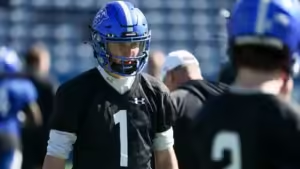
GSU Panthers QB, Zach Gibson files $10.7 million lawsuit against the team.
In a significant development for the Georgia State University Panthers, quarterback Zach Gibson has filed a $10.7 million lawsuit against the team, alleging multiple grievances related to his treatment and rights as a student-athlete. The lawsuit, which has sent shockwaves through the college football community, raises serious questions about the responsibilities of athletic programs towards their players.
Gibson claims that the Panthers’ coaching staff and administration failed to provide adequate medical care and support following injuries sustained during his tenure with the team. He alleges that the lack of proper medical attention not only exacerbated his injuries but also significantly impacted his performance and future career prospects. This claim highlights the ongoing debate about player safety and health in college athletics.
In addition to medical negligence, Gibson accuses the team of wrongful termination from his scholarship following an alleged incident that he contends was mishandled by coaching staff. He asserts that his dismissal was not only unjust but also violated NCAA policies regarding athlete treatment and scholarship security. This allegation sheds light on the complexities of player rights within collegiate sports.

Gibson’s lawsuit details specific incidents where he claims he was pressured to play despite being injured, raising concerns about the culture of prioritizing wins over player well-being. The quarterback argues that this pressure created an unsafe environment, one that prioritized team success over the health and safety of the athletes involved.
Moreover, the lawsuit points to a lack of support from the university regarding mental health resources for players. Gibson expresses that the emotional toll of the injuries and subsequent fallout contributed to his distress, which he believes was exacerbated by the university’s inadequate mental health services for student-athletes. This aspect of the lawsuit underscores a growing awareness of the mental health challenges faced by athletes.
The lawsuit also outlines claims of defamation against coaching staff, alleging that negative remarks made about him have tarnished his reputation both within the university and beyond. Gibson states that these comments have hindered his opportunities for future athletic pursuits, including potential transfers to other programs or professional opportunities.
In a statement, Gibson expressed his determination to seek justice and accountability, emphasizing that this lawsuit is not just about financial restitution but about ensuring better treatment and support for current and future student-athletes. He hopes that his actions will lead to significant changes in the way college football programs handle player welfare.
The response from Georgia State University has been measured, with officials stating that they are aware of the lawsuit but cannot comment further due to ongoing legal proceedings. However, this case has sparked discussions among other student-athletes and advocates about the rights of players and the responsibilities of college athletic programs.
As the lawsuit unfolds, it may have far-reaching implications not only for Gibson but for the entire landscape of college athletics. The case highlights the urgent need for reforms regarding athlete health, safety, and rights, pushing the conversation into the forefront of public discourse.
Zach Gibson’s legal battle is poised to serve as a catalyst for change, potentially influencing policies at various levels of collegiate sports. The outcome of this case could reshape how universities approach the well-being of their athletes, ensuring that their health and safety are prioritized in the fiercely competitive world of college football.
Leave a Reply